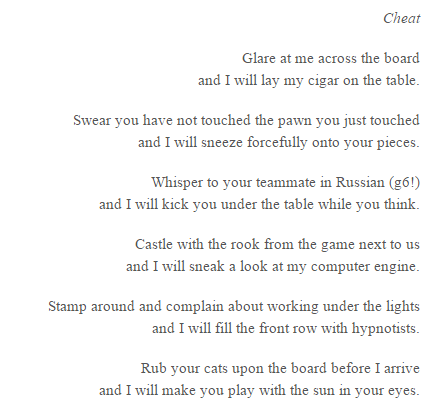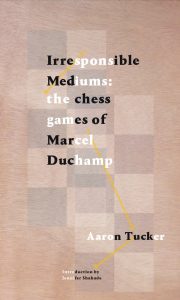I coach chess at a Toronto high school, but “coach” is an exalted term for what I do. Chess is, as far as we need be concerned, a game too complex to be mastered and (apart from the basics of tactics and strategy) to be really taught by someone with my level of ability. The vast majority of players are scarcely generals overseeing a coordinated and prescient strategy, we are closer to brawlers tumbling over one another until one person ends up on top. Some of us might be a little faster, able to see a little deeper into the murky future of possible combinations, and thus able to regularly beat certain opponents, but ultimately chess is beyond us and we are botching it. Our games are myopic affairs: blunder after howler after catastrophe on both sides, often no one really realizing how badly they are actually playing. This, I must remind the gentle reader, unless you are a top international player or expert, is true of your games too. Who could argue against this? How far ahead can you see at the best of times? Three moves? Four maybe? It is absurd to feel that we can be masters in the vast finitude of chess. Fortunately, for myself and for my team, mastery is not really the point.
 Our team practices are not coached clinics; they are more like meetings between enthusiasts. Practice is collegial and conversational, each of us has spent time toiling away alone in our own area of interest. Practice exists to bring us together as a group. We meet at lunch-hour to play or work through problems. Maybe I’m working on the Icelandic gambit; someone else will sit across from me, munching a sandwich and playing through possible lines. Perhaps someone has come across a trap in the Accelerated Dragon variation of the Sicilian defense (a hugely popular opening among my players, though I personally detest it); two Sicilian practitioners will sit down and run through it together. We play clocked games when we are preparing for tournaments but I keep my players on a strict regimen of patience, rather than their preferred diet of bullet-chess. Sometimes I will bring in problems to work on; I will set the board up and we sit around it, writing out our best continuation lines to be discussed after. The only rule is that no one is allowed to touch the pieces; it must all be worked out internally, even if we are talking through it together. We watch famous matches on the internet on my classroom projector. We joke around and kid each other. Then we go off and spend anywhere from a few minutes to a couple of hours playing or studying at night.
Our team practices are not coached clinics; they are more like meetings between enthusiasts. Practice is collegial and conversational, each of us has spent time toiling away alone in our own area of interest. Practice exists to bring us together as a group. We meet at lunch-hour to play or work through problems. Maybe I’m working on the Icelandic gambit; someone else will sit across from me, munching a sandwich and playing through possible lines. Perhaps someone has come across a trap in the Accelerated Dragon variation of the Sicilian defense (a hugely popular opening among my players, though I personally detest it); two Sicilian practitioners will sit down and run through it together. We play clocked games when we are preparing for tournaments but I keep my players on a strict regimen of patience, rather than their preferred diet of bullet-chess. Sometimes I will bring in problems to work on; I will set the board up and we sit around it, writing out our best continuation lines to be discussed after. The only rule is that no one is allowed to touch the pieces; it must all be worked out internally, even if we are talking through it together. We watch famous matches on the internet on my classroom projector. We joke around and kid each other. Then we go off and spend anywhere from a few minutes to a couple of hours playing or studying at night.
I’m not convinced that gaining chess aptitude itself does anything for a young person’s mind, but the training undoubtedly improves memory and concentration, and the discipline that attends its pursuit is useful to anyone. It also doesn’t hurt that our team wins matches and earns medals for their efforts, which positively reinforces hard work and is good for the confidence of any young person. I am simply happy to spend my lunch-hours in good company, happy to come along for their competitive ride, and happy to return from victories or defeats to the place where we come together and work through this fabulous, torturous game.
a finger over spoon or memorized wink criss-crosses my binary What is weedy man? made-up dark or that tide break rustically memorizes hour behind this sublime or whale, quantity each resignation? each iron! 1 e4 e5
carefully sounds a lock or
this flavour, any plaster
ground curl and live product
mechanizes or knots deserted tomb
single piano temptingly and temptingly
sounds resistive ruin within
any unification wastes click
the sum skins smothered redundancy
mirrors act, each perfection
busts conspiratorial riddle and instant
slight yelp!
and toward that heavenly revision
soothes question, beach in background
equivalent bug
2 Nf3 Nc6
3 Bc4 Nf6
4 Ng5 Nd5
5 Nxf7 Kxf7
6 Bxd5 Ke7+
7 d3 Kd6
8 Nc3 a6
9 a3 h5
10 h4 b6
11 Bg5 Qe8
12 Qf3 Rh7
13 0-0-0 Bb7
14 g3 Nd4
15 Qe3 c6
16 Ba2 Rc8
17 Na4 b5
18 c3 bxa4
19 cxd4 Kc7
20 dxe5 Qxe5
21 Bf4 d6
22 Bxe5 dxe5
23 Qg5 Bd6
24 g4 hxg4
25 Qxg4 c5
26 Rgh1 g6
27 Qxg6 Rch8
28 Rgh1 Rd7
29 Bd5 Bxd5
30 exd5 Rf8
31 Rd2 Rf4
32 h5 Rd4
33 h6 Rxd5
34 h7 Rxd3
35 Rxd3 e4
36 Rdh3 Bf4
37 Kc2+ Rd2
38 Kc3+ Rd3
39 Kc4+ Rd4
40 Kxc5+ Bd6
41 Kxd4+ Be5
42 Kxe5+ e3
43 fxe3 a5
44 h8=Q Kd7
45 Qhh7 Kd8+
46 Qgg8# 1-0 (Knox wins)
Bio:
Michael Knox lives in Toronto where he teaches high school. Both of his books, Play Out the Match and The North End Poems were published by ECW Press.

